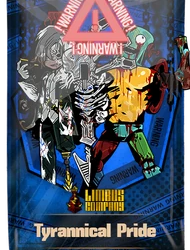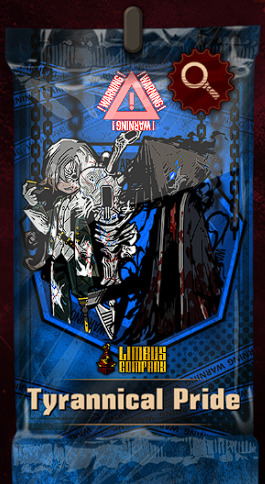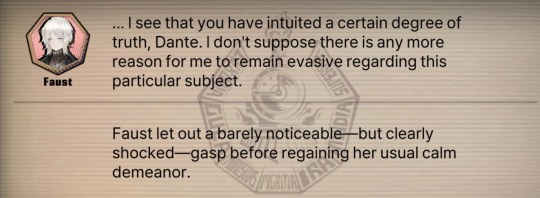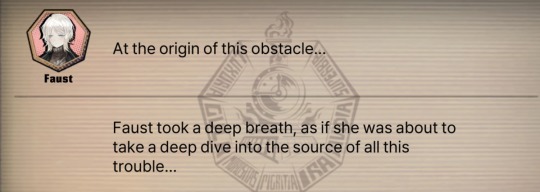Bi He/Him guy! Artist and Professional Rambler (when I get the urge). Somewhat-likely to have pauses of activity here. Nice to see you!
Last active 4 hours ago
Don't wanna be here? Send us removal request.
Text

limbus-style skill icons for lobcorp damage types asdasfwf
#dude wait i need these in higher quality and transparent this is super cool#Like I make ID pages for my OC sinners and EGOs and stuff and. format it like as if they were in-game or on the Wiki#and these would be SO cool to use. please if possible.
2K notes
·
View notes
Text

THEY HELD ON WITH 0 HP AND CAME BACK AFTER A SURGERY USAGE TO FINISH THE JOB
they killed him. i cant believe it they killed Hurtily (before and after the recent update). they claimed his surgeried bones.


34 notes
·
View notes
Text
project moon rolls worst story chapter overall ever so far, flanderizing their characters and their bonds and creating a random hope betrayal, asked to rewrite Intervallo 7.5 guess they weren't kidding at the start, Wings Regular Checkup is hell.
at the very least Hohenheim is an interesting character, and the Sin explanations he gave were cool.
#limbus company#project moon#tanktalk#intervallo 7.5#was bound to happen maybe. we need some Horrible Writing to keep our Immaculate Writing karma
8 notes
·
View notes
Text
they killed him. i cant believe it they killed Hurtily (before and after the recent update). they claimed his surgeried bones.


34 notes
·
View notes
Text
Hm. Just finished watching a special someone play Mouthwashing. Time to be very Normal about this for a while and compare it to other media and games in themes and realistic portrayals of mental instability, decline, and reactions to events with the weight of responsibility and the hell we can make for ourselves no matter our intentions.
#mouthwashing#mouthwashing game#tanktalk#maybe ill actually make art of such a comparison and actually post something here confidently
7 notes
·
View notes
Text

projecting my period cramps onto macbeth (my bfs limbus oc)
ft. new sona design (he/they btw)
7 notes
·
View notes
Text
random thoughts I've been having on some of the connections between Aleph Abnormalities: some of them feel like they're more deeply connected to Lobotomy Corporation and it's employees than many other Abnos. Melting Love is the result of an agent getting atttatched to a slime blob from a failed experiment, and Mountain of Smiling Bodies came from a botched cleanup after a disatrous breach killed a lot of employees. They're both direct products of human error.
Plague Doctor claims to want to help people but turns them into it's minions when it turns into WhiteNight, Army in Black claims to want to protect people but turns black and breaches when it absorbs too much negativity from their hearts, and agents develop a cult-like worship of Blue Star because they believe in a sort-of afterlife if they jump into it. These three, whether actively or unintentionally, seem to exploit the faith and trust of the employees, their desire to be helped or to be literally anywhere other than where they are now.
Alephs are powerful and threatening because they can do a lot of damage, yes, but what makes them worse, what makes them truly deserving of the highest tier of threat level, is the way they are the result of or take advantage of deeply human psychological vulnerabilities.
#rb#sorry to rb you so often so many times its felt like but YEAH!!!!!! I NEVER REALIZED THIS BUT YEAH!!!!! Goodness
66 notes
·
View notes
Text
Playing LobCorp, you start to understand Ayin's perspective because mechanically the game forces you to make ruthless choices in order to progress, and after a while you become fixated on making sure that those efforts and sacrifices count for something in the long run even if that means making even more sacrifices to reach your goal.
And you also understand Angela's perspective because after a few dozen hours of resetting and repeating you start to want nothing more than to get out of this goddamn time loop.
65 notes
·
View notes
Text
About a few weeks late but Finishing Canto 7 was the coolest thing ever for numerous reasons.
The Ending
A new Kin and Favorite Character (what an ingenious character...)
Beating the final fight with four sinners left on the field, all of which underleveled (levels 40-45). One of which who finished him off was my Level 16 Los Mariachis Jefe Sinclair spamming E.G.O. who was never intended to see the light of day past being a support passive.
#limbus company#limbus company canto 7#canto 7 spoilers#canto vii spoilers#funny thing was it was also my first fight ever seeing the Wild Hunt Revive mechanic actually pop off which was Terrifying to realize.#think it was W Don that i had in there with Rhino Meursault and Dieci Hong Lu in the end. with the aforementioned Mariachi Sinclair#tanktalk#project moon
38 notes
·
View notes
Text
Any jokes or memes or analysis that paints Ayin as a messiah figure and Carmen as a big bad evil are really missing the point, nor is the vice versa quite true either (though there is some interesting religious symbolism). Neither of the two is a monster or a saint, they're both just fucked-up humans.
Ayin...definetly did do some horrible things and hurt a lot of people, from close friends to strangers. He could be a textbook definition of the word "ruthless" - but he's not "heartless", the fact that he built his own hell just to torment himself into understanding his mistakes and making amends testifies to the collosal guilt and regret he felt.
Some people look at what he did in order to achieve his goal of finishing the Tree of Light and say "he had good intentions". Well, helping achieve a dead friend's dream is a very kind thing to do, and Carmen herself had good intentions too, but Ayin never loved humanity half as much as she did - he's not doing this to help people, he's doing it just because of her. So the idea of good intentions but bad methods kind of falls apart too. Ultimately, neither Ayin nor Carmen or their actions are good or evil.
We're shown and told time and again that the City is a stagnant dystopia where things rarely change, and almost never change for the better. In contrast to this sort of world, Carmen is a selfless, kind, and forward-thinking person, and that's why so many people, including Ayin, flock to and obsess over her. I think, in Ayin's mind, letting her dream die with her or with the destruction of the lab would be giving up on that potential for change that she represented - as if both her life and her death counted for nothing in the end. That's why he gets so intense about completing the project, because he feels he has to make it all worth something, and that impetus only gets stronger and stronger as the bodies of friends and strangers pile up. To him, giving up and stopping at any point would render all the sacrifices, especially Carmen's, worthless, and that's unthinkable. (he's also a textbook example of "sunk cost fallacy")
My main point here is actually that the word "Ayin" means "nothingness" in Hebrew, relating to a concept of the divine creating something from nothing. That, more than anything, is what it's all about for him. He's not driven by either cruelty or compassion, good or evil, but the even more base human need to find or create meaning in an otherwise empty world.
#rb#THIS!! THIS is why I love the ABC crew so much. The three can be so easily attributed to Bad Neutral and Good but theyre all SO much more#like Ayin did GROSS things but he regrets and tortures himself for it as well- he might not 100% even WANT to redeem himself but hes more#than just gross and egotistical. He really tried. And Carmen is held up above as like a kind of perfect being when she never wanted that#and it makes her loopy in her determination when things go rough and shes basically the figurehead. she had to do something about the world#And Ben is so much of use to them all but he has his own strange activities in holding the two on podiums as well- but being genuine#..If stubborn. But also effective and thoughtful. You get what Im saying. None of them are evil and none of them are perfect.
112 notes
·
View notes
Text

Who let Kim Jihoon write all over the first banner in the Special Limbus Pass.
33 notes
·
View notes
Text

Was looking at the original image (in Read More) and had this revelation. (Angelica is the one taking the picture) They would have done this.

#project moon#my art#tanktalk#roland#roland library of ruina#library of ruina#angelica library of ruina#surprisingly and ashamedly turned out to be quite informative on proportions and clothing folds for me
26 notes
·
View notes
Text
FIRST ART POST . PHINEAS AND FERB.

if you are going to repost anywhere give CREDIT PUH-LEASE!!!!!!! :3
#rb#YES!!!! This is my friend Lumi look at how they combine and tint colors and outlines please and thank you. Awesome stufffff
7 notes
·
View notes
Text
The real Ayin fans are the ones that put him in an enclosure and occasionally drop him Carmen pngs with scribbles on it to see what happens. Sometimes, one of them is blue.
The real ones go "this guy is so fucked up, i love him, he sucks" like with any complex character that does fucked up shit.
THE FUCKED UP SHIT IS BIG PART OF THE APPEAL
42 notes
·
View notes
Text
I finally crumpled. Folded. I finally gave in to the Walpurgis and spent real life money on Lunacy to get myself to the Pity for Solemn Lament Yi Sang.
I also have Yuri Announcer though too now so overall my money has been well spent.
3 notes
·
View notes
Text
[Limbus Company] Faust’s Development (or Lack Thereof) in Intervallo 6.5

So Murder on the WARP Express came out and uh… The suspicions I had regarding Faust’s future arc ended up being confirmed. Faust is definitely not reaching out to the truth. I didn't expect the seeds for her story to be planted so soon, but here we are. It’s real. And you're probably thinking, “Uh… WTF are you talking about?” Let me explain to you what I mean.
The message of Library of Ruina is a critical part to understanding what's going on in Limbus Company. I will tell you straight-up here and now, absolutely nobody in the fanbase knows what the hell LoR is actually about. Nobody. And it is such a shame, because it has such a great message that absolutely nobody talks about. I'd love to tell you much more about it, but that involves long explications on Jungian Psychology, the Jewish Kabbalistic Tree of Life, and the story itself, which I don't wanna subject you to yet (I am saving my esoteric lore dumping for the video scripts I’m currently working on). What I will tell you, however, is that the lessons learned by Angela and Roland in LoR are all about opening oneself to everything that is possible in life. The ways in which they do this are:
(1) To listen to one's inner world, or intuition. Don’t just blindly believe whatever someone else says. Follow your own inner voice.
(2) To listen to one's outer world, or reason. Don't just believe whatever you want to believe. Look at the facts and be receptive to others' opinions.

That's all you need to know for now about this particular subject. The theme of opening oneself to infinite possibilities is one that carries over from LoR to Limbus Company, and it is present in every Sinners' story. Literally all of them were/are limiting themselves in one way or another due to their flawed beliefs. And each of them is on their own journey of self-realization, or in Jungian terms, “individuation.”
The Mirror Worlds also expand on this theme. They provide infinite ways of looking at the same subject, which sounds wondrous and exciting at first, but it really just reflects what's already there. Remember Yi Sang's and Heathcliff's arcs? For Yi Sang, the Mirror reflected his already-existing potential, while for Heathcliff, the Mirror reflected his surrender to a perceived fate. Mirror World Identities may offer additional combat prowess as well as insight into the characters/worldbuilding, but they end up being quite limiting due to their usage (basically “cheating”) and very nature (as "reflections").
Moreover, Goethe's Faust was something that repeatedly showed up in my research on Jungian Psychology. I kept finding Faust's story referenced in articles, academic journals, as well as the book I'm currently reading called Man and His Symbols. This book was written by Carl G. Jung and some of his most trusted followers, and it legitimately explains what Project Moon's mindset was while forming the world and stories of their games (I am not even exaggerating. I have to constantly pause my audiobook and write down notes on what I'd just read because it keeps indirectly revealing PM’s intentions for the series). Anyway, in one of Joseph L. Henderson's chapters named “Heroes and Hero Makers,” he talks about how the archetype of the hero cycle is represented in many stories. An aspect of this archetype essentially revolves around the “hero vs. villain,” or in Jungian terms, the “ego vs. shadow.” The hero must face off against the dragon and triumph. It’s about the development of consciousness through the "ego" (awareness that one exists and has an identity) mastering and assimilating the "shadow" (the parts about ourselves we don’t like or don’t acknowledge deep down). This archetype exemplifies the stage that’s supposed to take place during childhood and adolescence—it’s about growing up. If the hero fails to slay the dragon, i.e. a person fails to assimilate their shadow into their psyche, they become stuck in this state of immaturity. Henderson uses Faust as an example:
“One can see this theme, incidentally, in a well-known literary hero figure—Goethe’s character of Faust. In accepting the wager of Mephistopheles, Faust put himself in the power of a “shadow” figure that Goethe describes as “part of that power which, willing evil, finds the good.” Like the man whose dream I have been discussing, Faust had failed to live out to the full an important part of his early life. He was, accordingly, an unreal or incomplete person who lost himself in a fruitless quest for metaphysical goals that failed to materialize. He was still unwilling to accept life’s challenge to live both the good and the bad” (Man and His Symbols, page 121).
Henderson is saying that Faust is reluctant to face life’s hardships, so he lets his unconscious aspects—his shadow, or Mephistophiles—control what he does because it’s easier for him to live that way. And as a result, he remains this underdeveloped, immature person.
In Limbus, Faust’s shadow is Mephistophiles, the reflection of her inner pride and desire to learn more. The knowledge she gains from the bus, her ability to communicate with her IDs, is incapacitating her ability to develop as a person. She’s using it as a crutch. And her overreliance on this knowledge, ironically, reveals how truly ignorant she is. The literal shadow cast in Faust’s E.G.O is her IDs for these very reasons—she is afraid of not knowing what to do.

Anyway, the reason I brought up LoR’s message and the Mirror Worlds earlier is because it is very, VERY relevant to Faust’s arc. Each of the Sinners need to reach out to all the possibilities of life. To not just blindly follow their own beliefs or the beliefs of others, but to see the truth through their own eyes, unclouded by bias. Through her use of the Mirror Worlds, Faust goes, “Well, I’m already reaching out to all possibilities! I’m following my intuition and using reason!” And she technically is, but it’s paradoxical. She is using intuition and reason… But it’s all through the use of her IDs, which are both “herself” and “not herself” at the same time. So she’s still just blindly following her own beliefs and the beliefs of others; she’s only listening to her own opinions and copying down what others say to her, all at the same time.
I noticed this while rereading key parts of the game again. In Episode 6-25, the Sinners discover the researchers’ experiments below Wuthering Heights. Faust was utterly oblivious as to what their goals were, and Dante commented on how odd her behavior was when she finally started talking.


Later in Episode 6-44, she urges them to find out who informed Erlking Heathcliff about the Mirror Worlds, causing them to pick up on the fact that she doesn’t actually know everything.

In Episode 2 of the 3rd Walpurgis Night, Faust freezes up when asked by Dante to give a more detailed explanation on the Library. She then gives soft confirmation that she is, indeed, in cahoots with her IDs.


Murder on the WARP Express spilled everything. As a result of being separated from Mephistopheles, she is forced to be without her IDs and must figure things out on by herself. Her complete cluelessness regarding what to do demonstrates her lack of any true life experience. She acts like a newborn baby attempting to walk. However, while she is clueless, she is not helpless. She, in fact, does have the potential to grow if she puts her mind to it. Faust exhibits curiosity, ingenuity, and amiability when she must undergo the trials of the WARP train incident.








She takes interest in the perspectives of the other Sinners when asking for help. She is able to discover new things and problem-solve by herself.

Faust can learn on her own and make friends if she really wanted to.
...Unfortunately, she falls back to her dependency on Mephistopheles at the end of the story and closes herself off once again.
Faust refuses to experience any pain that could otherwise spark a realization about herself. She is harming her ability to form relationships with others, as she habitually ignores them or prevents them from giving her advice. She actively denies herself the chance to truly learn about the world and come to her own conclusions—she is impeding her own personal growth.
Out of all the Sinners, Faust is probably the least developed as a person. Yi Sang, Ishmael, Heathcliff—even those who are about to undergo or are still undergoing their arcs such as Don Quixote, Rodion, or Meursault—are fully-formed people. Faust is not. She is still stuck at the stage of having evolved ego-consciousness while everyone else around her is already achieving the Self. She's worryingly far behind. It’s honestly really sad to watch.
I was debating on whether or not I should make this post for a few reasons. For one, I’m unable to read Goethe’s Faust at the moment, as I am still preoccupied with my research on Jungian Psychology and Jewish Mysticism for the previous two PM games (Lobotomy Corporation and Library of Ruina). I didn’t want to say anything too specific about Faust’s story until I read her book. Secondly, this topic is really difficult to explain without delving into the Jungian elements in the PM universe. I felt I would end up confusing people if I just came out of nowhere with this post; I initially wanted to speak more about the foundational elements before anything else.
Nevertheless, I feel that this knowledge I had on Faust, Jung, and PM’s lore was relevant enough to share. I was SHOCKED at how accurately I had predicted Faust’s future character development. The only other person I told this to was my younger sister, and I said, “Faust basically found a loophole through the lessons Angela and Roland learned in LoR. She’s only believing whatever she wants to believe, while also only believing what other people tell her. She’s using Mephi and her IDs as a crutch… I think that’s why she’s alone a lot of the time.” AND I ENDED UP BEING RIGHT. I had to stand up multiple times while playing through the Intervallo with my sister because of how excited I was at this.


Murder on the WARP Express demonstrates that a good understanding of the games’ themes and of Jungian literary analysis is absolutely essential to figuring out each Sinners’ arc in Limbus. Deciphering, for example, the specifics of Faust’s connection with Gesellschaft is not-so-much valuable as having a strong grasp on what aspects of her character PM is trying to explore. “What is the text communicating? How does it relate to Jung’s ideas? What is the lesson this character is meant to learn?”
That is what matters at the end of the day.
306 notes
·
View notes


